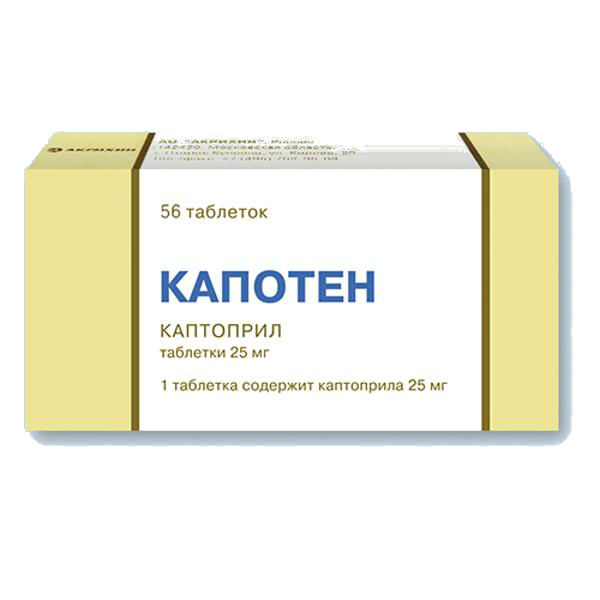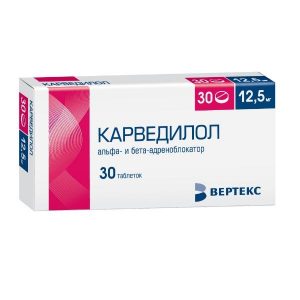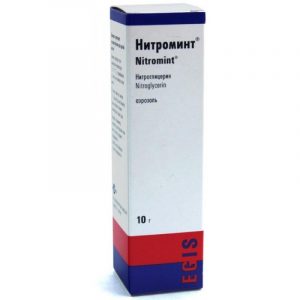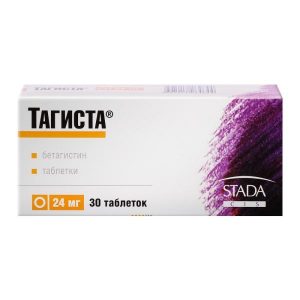Description
Release form
Tablets.
Packaging
56 pcs
Indications
– arterial hypertension, including renovascular (including uncomplicated hypertensive crisis)
– chronic heart failure (as part of combination therapy)
– acute myocardial infarction: during the first 24 hours after a heart attack with a clinically stable condition
– dysfunction of the left ventricle (ejection fraction of the left ventricle 40%) after myocardial infarction in a clinically stable state to reduce the incidence of clinically severe heart failure, increase survival and reduce the frequency of hospitalizations for about chronic heart failure
– diabetic nephropathy with diabetes mellitus type 1 (with albuminuria more than 30 mg / day).
Special instructions
Caoten should be prescribed with caution in case of collagenosis because of the increased risk of neutropenia and agranulocytosis.
When prescribing the drug to patients with severe impaired water-electrolyte balance, this condition should be corrected. During treatment with Kapoten, it is not recommended to take potassium-sparing diuretics or potassium preparations, especially for patients with severe renal impairment.
Angioneurotic edema of limbs, face, lips, mucous membranes, tongue, pharynx or larynx is observed in patients with the use of ACE inhibitors, including captopril. If swelling is limited to the face and lips, this condition usually disappears after discontinuation of the drug. Antihistamines may be used to alleviate clinical symptoms. Patients should be monitored by a doctor until symptoms disappear. If the swelling covers the tongue, pharynx or larynx with a threat of airway obstruction, s / c 0.5 ml of 0.1% adrenaline solution should be administered.
During treatment with Kapoten, a low sodium diet is indicated.
Kapoten may cause a false-positive reaction when analyzing urine for acetone.
Use in pediatrics
Safety and efficacy of the drug in children have not been studied.
Composition of
One tablet contains:
active ingredient: captopril in terms of 100% substance – 25 mg
excipients: microcrystalline cellulose, corn starch, stearic acid, lactose monohydrate.
Dosage and administration
Doses of Kapoten should be selected by the doctor. Inside, an hour before meals, 25-50 mg 2-3 times a day (but not more than 450 mg per day), for children, the initial dose of 0.15-0.3 mg / kg (but not more than 6 mg / kg day).
Side effects
From the cardiovascular system: orthostatic hypotension, tachycardia, peripheral edema.
From the respiratory system: dry cough, bronchospasm, pulmonary edema.
Allergic reactions: angioedema of the extremities, face, lips, mucous membranes, tongue, pharynx or larynx.
From the water-electrolyte balance: hyperkalemia (most likely with renal failure), hyponatremia (most often with a salt-free diet and the simultaneous use of diuretics.
From the urinary system: proteinuria, increased plasma urea and creatinine, acidosis.
From the hematopoietic system: in rare cases – neutropenia, agranulocytosis, thrombocytopenia and anemia, a positive test for antibodies to the nuclear antigen.In patients with normal renal function (CC less than 1.6 mg / dL) in the absence of other complicating factor Neutropenia was observed in 0.02% of cases
From the digestive system: reversible and usually self-passing taste disorder, dry mouth, aphthous stomatitis rarely – abdominal pain, diarrhea, gum hyperplasia, hepatitis, elevated levels of hepatic transaminases in blood plasma, hyperbilirubinemia.
Dermatological reactions: maculopapular rash, usually accompanied by itching and, in rare cases, fever, hyperemia, vesicular or bullous rashes, erythema (including Stevens-Johnson syndrome), photosensitivity.
From the side of the central nervous system and peripheral nervous system: headache, dizziness, ataxia, paresthesia, drowsiness, visual impairment.
Drug interactions
Diuretics, vasodilators, ganglion blockers, adrenergic blockers, while using, enhance the antihypertensive effect of Kapoten.
Indomethacin and other NSAIDs, as well as clonidine, can reduce the antihypertensive effect of Kapoten.
Against the background of the simultaneous use of Kapoten with allopurinol and procainamide, neutropenia and / or Stevens-Johnson syndrome can be observed, but the causal relationship of these phenomena is not clear.
With simultaneous use of immunosuppressants with Kapoten (e.g. azathioprine and cyclophosphamide) increases the risk of hematologic disorders.
With the simultaneous use of probenecid, captopril excretion in urine is reduced.
The simultaneous use of lithium and Kapoten salts can lead to an increase in serum lithium concentration. This increases the risk of side and toxic effects of lithium preparations.
Concomitant use of Kapoten with potassium-sparing diuretics (triamteren, amiloride and spironolactone) or potassium preparations can lead to hyperkalemia.
Overdose
Symptoms: marked decrease in blood pressure.
Treatment: Plasma replacement drugs and hemodialysis are effective.
Storage conditions
The product should be stored in a dry, out of the reach of children at room temperature.
Shelf life
5 years.
Deystvuyushtee substance
Captopril
Terms and conditions
prescription
dosage form
tablets
Possible product names
KAPOTEN 0.025 N56 TABL
Kapoten 25mg Tab. X56 (R)
Kapoten 25mg No. 56
KAPOTEN 25MG. No. 56 TAB. / AKRIKHIN /
Kapoten tablet 25mg N56
Akrikhin HFK AO, Russia




